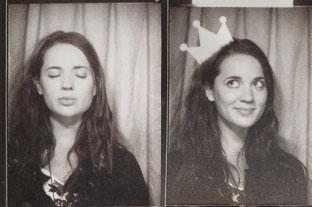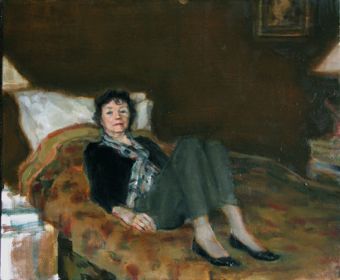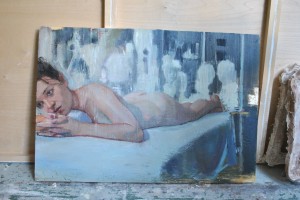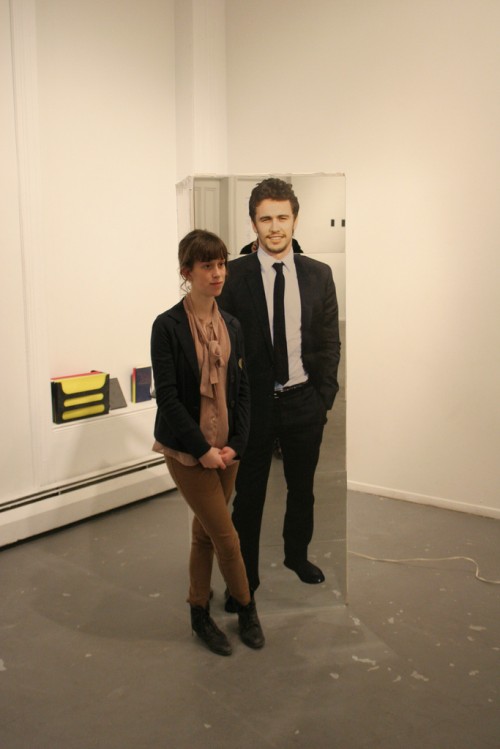Web Hype
your actions become more forgivable if you don’t know the rules: an interview with Harriet Alida Lye
 I wanted to talk to Harriet on here because I like what Harriet is doing and I think people ought to know. What Harriet is doing is living in Paris as a Canadian expatriate, publishing a journal that keeps getting better, writing her own fiction, and essentially just doing it. In the last three years, I’ve watched her journal, Her Royal Majesty, grow from printer paper and staples to cardboard and printer paper and staples to letterpressed covers and hand-sewn binding to its most recent incarnation as a slick and perfect bound gem. Something I love about the journal is how fully-considered each issue is — unlike most “journals of the arts,” the art isn’t an afterthought in Her Royal Majesty. The layout and design — the way the thing functions and moves as a whole — seems prized above all, which makes each issue less a collection of contributors’ work and more like a large-scale collaborative project. The journal has recently expanded its online presence with a fancy new website and very nice looking blog called HRM Daily, which I advise people to look at. I’m thrilled that Harriet has kept the faith and never looked back. After the jump we talk about the journal, being a foreigner, James Franco, and European MFA programs (they don’t really exist).
I wanted to talk to Harriet on here because I like what Harriet is doing and I think people ought to know. What Harriet is doing is living in Paris as a Canadian expatriate, publishing a journal that keeps getting better, writing her own fiction, and essentially just doing it. In the last three years, I’ve watched her journal, Her Royal Majesty, grow from printer paper and staples to cardboard and printer paper and staples to letterpressed covers and hand-sewn binding to its most recent incarnation as a slick and perfect bound gem. Something I love about the journal is how fully-considered each issue is — unlike most “journals of the arts,” the art isn’t an afterthought in Her Royal Majesty. The layout and design — the way the thing functions and moves as a whole — seems prized above all, which makes each issue less a collection of contributors’ work and more like a large-scale collaborative project. The journal has recently expanded its online presence with a fancy new website and very nice looking blog called HRM Daily, which I advise people to look at. I’m thrilled that Harriet has kept the faith and never looked back. After the jump we talk about the journal, being a foreigner, James Franco, and European MFA programs (they don’t really exist).
What are some of the pleasures and challenges of living there, being a non-native writer/reader/editor/person?
There is a large Anglophone community that provides a solid network here. This can be both a pleasure and a challenge. It’s nice – it’s wonderful – to have people speak your language and share a sort of cultural background. There’s a tension there, though, in terms of trying to adapt to and adopt this place where we’ve all (us expats, I mean) have chosen to live, and that, fundamentally, does not include other expats.
In terms of my magazine, I think that my being a foreigner gives me a certain advantage. Thinking about it now, I guess I feel this advantage in other ways, not just in terms of Her Royal Majesty. A lot of my jobs here have been contingent upon the fact of being a bilingual, native-English speaker – using your foreignness to your advantage is definitely easier than trying to fit in and do things the French way. Also, your actions become more forgivable if you don’t know the rules, and the French are famous for their regimented rules and impossibly cyclical bureaucracy. Because of this, I feel like a lot of the new ideas and activities necessarily come from expatriates, who are blissfully unaware of the structures and restrictions that they should be following and can therefore bypass them with greater ease. For example, when I was working with a French gallery near the Opera Garnier to organize the launch party for the 10th issue, one of the French interns at the gallery said that he would never even try to organize such a thing because he is too aware of and intimidated by the bureaucracy and the whole process of approaching the press, other galleries, etc. I’m not aware of these things and so I’m not intimidated in the same way.
That’s awesome… and that experience seems like sort of a ready parable for the creative act: the less aware you are of the rules, the more possible and free things are. Would you agree with that?
Yeah, I would agree with that. I might even go further and say that if you are unaware of the creative act itself, or of your approach to it at least, then you feel more free in terms of your approach to it. In this same way, restrictions can sometimes liberate you (like with Oulipo).
How would you say living in Paris has affected your own writing?
I started really writing when I was living in Paris so it’s hard to separate my writing about/ in Paris from my writing in general. They’re sort of the same thing, though they don’t rely on each other – I did a lot of writing when I was living in Halifax, too. However, being a foreigner in a place heightens your awareness to certain things, can open your receptors. I think I have to see things as “strange” to be interested in writing about them.
What is the state of academic creative writing in Europe? Can you talk about what your experiences have been with the teaching of creative writing abroad?
I can’t speak of the general state of academic creative writing in Paris, let alone Europe as a whole, but all the programs I know that teach creative writing do so in English. I did do some guest lectures at creative writing programs this summer, but these were American students (for the most part, though it was an international program) and American teachers. To my knowledge, these American-style MFA programs don’t exist in Europe. It seems like people just do it – make the art they want to – or not.
I recently got a job in the weekly creative program at a French institution and my official title is “storytelling and creative writing”. I think that’s just to flatter me, though – the kids aren’t bilingual and range in ages from 7 to 9, so the primary goal is to make their spelling a little bit less creative. One girl told me she had fights with her sister on their summer vacation, and in her composition she wrote: “I farte wit mi seesta on the biche.”
Where do you get hard-to-find books from?
I get books from Shakespeare & Company or borrow them from my friend Lauren Elkin, and if I can’t get them from either of those venues then I’ll buy them second-hand online (this is mainly for comic/art books – my three recent purchases are “Radioactive: Marie & Pierre Curie: A Tale of Love and Fallout” by Lauren Redniss; “Wilson” by Daniel Clowes; and “Asterios Polyp” by David Mazzucchelli).
How are you supporting yourself? Do you have a day job? Has it been hard finding steady employment as an expat? How long have you been in Paris and how long do you see yourself staying there?
I have never not had a day job, even if it’s just a patchwork of odd-jobs that, combined, somehow make (or not) enough money to live on. My jobs here have ranged from Director’s Assistant at an arts centre, bookseller at Shakespeare & Company, cultural journalist for a French magazine, copy editor for some European charities and agencies, English teacher for the children of rich and famous art collectors and lawyers, reporter for the English news desk at France 24 (national news station), personal support worker to the handicapped son of Julia Kristeva…
The longer I’ve lived here, the more things come together, the more opportunities arise. This is true for any place, of course, but I think there’s a particular synchronicity to this part of life here. I established myself as a freelance writer/editor and teacher nearly a year ago now, but that didn’t really change anything about my daily life other than the fact that it makes other people think I’m more serious.
I also work as a live model for Rosy Lamb, one of my dearest friends, an artist whose work I deeply admire and respect – I publish her work regularly in my magazine. That’s one of the most delicious jobs, getting paid to lounge around naked in her beautiful studio and eat peaches and talk about life and art until our tea gets cold. It’s one of the few times that I get to just lie down and allow myself to think. I sometimes fall asleep, but when I’m awake and we’re not talking, I get a lot of good thinking done. We’re actually working on a project together, a sort of conversation between artist and model that we’re hoping to publish along with some of our respective work. It’s like a convergence of two artists who work in different mediums, and are together working on a piece together. I feel very much a part of the paintings she makes of me – like it couldn’t happen without me – and posing also makes me feel very present in myself. She transforms, with great effort, my body to colours on plaster. Her brush picks up greys and greens and oranges and then, magically, skin is created.
Working lots of different jobs sometimes feels like I’m always working, but it also sometimes feels like I’m never working – there’s the fact that variety keeps things interesting.
Do you feel influenced by the Paris expatriates of the past — either in their actual work or the mere example of their expatriate-ness? Is their presence felt? Do you feel as if you are part of a tradition at all?
I mostly don’t think about it. People say that Paris is like a living museum – they say this implying negative connotations – and I think that if you allow yourself to live in the past and think too much about “predecessors,” then you’ll feel confined by this so-called museum. Of the expatriate community you’re referring to, many of them (the Beats, especially) never lived here with the intention of setting down roots. That certainly changes the way you live in a place. Shakespeare and Company, for example, is a beautiful, labyrinthine trove full of life and movement and is very much a hub that concentrates and creates much of the contemporary literary scene here, but for some visitors to Paris, it can serve as a “living museum” of expatriate writers.
I see myself staying for a while – at least, my actions imply a long-term life, regardless of how long I’ll actually stay. I say, somewhat jokingly, that I’ll stay here until I’m 26 because that’s when the youth discounts end.
Although it’s still true that people move to Paris to pursue artistic ideals and adventures, I don’t really feel a part of that movement, though I surely fit many of the characteristics. I just feel like I’m living my normal life here; I feel more at home here than I have in any other place.
Right now, I would say that I’m more interested in becoming more involved with the French literary community – observing and contributing as an Anglophone, I mean, not in trying to become French in the process.
As far as the journal is concerned, there are two things I want to ask about. Was there something about an early, as-yet-unpublished Alice Munro story?
Alice Munro is one of my favourite writers, and having grown up in a town very near where she grew up, I felt a certain kinship to her from when I first started reading her. She has the most lucid way of writing about the most intimate but universal subjects, a way of bringing you into a world you already reside in but hadn’t realized was quite the way that she makes you see that it is. I had read about a short story she’d written when she was only 18, published in her university’s undergraduate journal and titled something very similar to one of her later short story collections. I couldn’t find the story anywhere, though – it was not anthologized or available to read in any other collection. I had been trying to track it down for months – over a year, actually – just to read it, not necessarily to publish it, though I would have loved to. I had no luck with her publishers or agents – after emailing back and forth for ages, they finally pushed me away. I had all but given up when I mentioned this to a friend, who contacted the university directly and had the librarian scan in the slides from the archives, and then we got permission straight from the student council, who still hold the copyright. The story, “Dimensions of a Shadow,” will be published in the 12th issue, to be published in March.
And was there something about a James Franco collaboration?
In the 11th issue, to be published on the 1st of November, we are publishing the process and product of a performative collaboration between James Franco and Alison Higgins, an artist from Halifax. The two never met but they corresponded for a few weeks to plan and curate a joint performance using some of James’s belongings and daily routines. The two made parallel paintings, and used Polaroids to document their performances in their respective cities. The work is really interesting and fits very well with the theme of this issue, Doubles.
The 11th issue of Her Royal Majesty will be released on Nov. 1st and celebrated with a night of art at Le Carmen in Paris. If you find yourself in Paris, do it.
Tags: Alice Munro, Her Royal Majesty, James Franco, Paris




i like it, drew. i like it, harriet.
She seems like an awesome person, I know I’m going to be looking into HRM! Sounds like a great magazine
Thanks, Mr. Davis – I hope to get the chance to read some of your work! Let us know what you think of HRM.
Hola, quizás os interese saber que tenemos una colección que incluye el
relato ‘The Progress of Love’ de Alice Munro en versión original conjuntamente
con el relato ‘Death by Landscape’ de Margaret Atwood.
El formato de esta colección es innovador porque permite leer directamente
la obra en inglés sin necesidad de usar el diccionario al integrarse un
glosario en cada página.
Tenéis más info de este relato y de la colección Read&Listen http://bit.ly/nkaASi
http://tinyurl.com/4skyaqr
[…] here. I’ve also written for or been interviewed by Nouvel Obs, Feuilleton, The Grid and HTML Giant. I was a reporter for France 24 for a hot minute as well, but that didn’t lead to […]
[…] Interview, in HTMLGiant […]